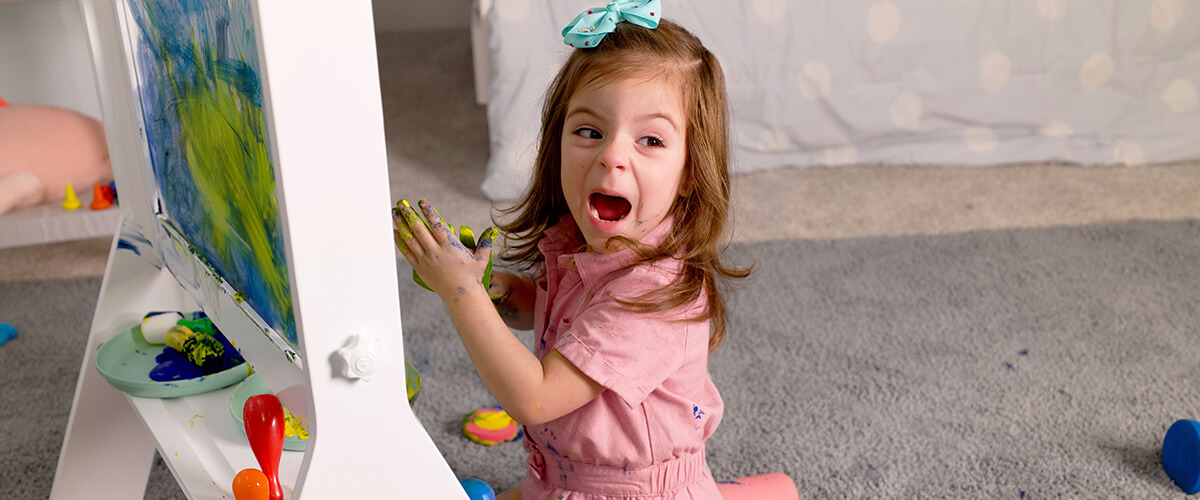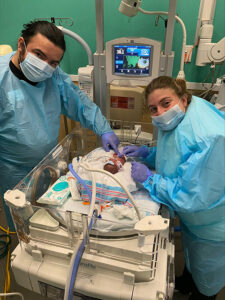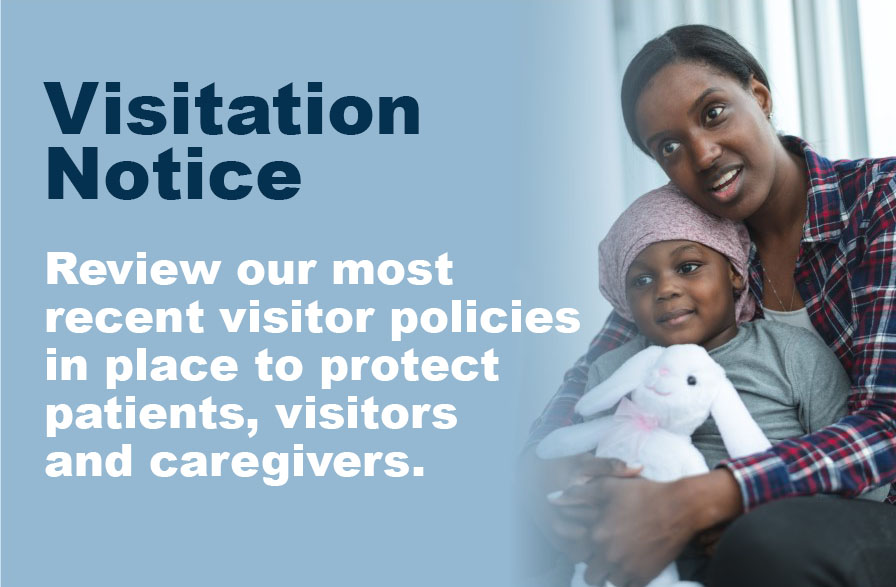
From Micro Preemie to Thriving 3-Year-Old: Grace Makes NICU History
Alana Alvarez describes her 3-year-old daughter Grace Guadalupe Medina as an independent spirit who loves to express herself through painting and music.
“She gets so caught up in the rhythm of jazz music, or just playing her own instruments,” says Alana. “She is passionate about what she wants and so full of life.”
Born at 23 weeks and 5 days and weighing just 14 ounces, Grace’s vibrant enthusiasm was evident the moment she entered the world. Thanks to the expert care at Atrium Health Levine Children’s Beverly Knight Olson Children’s Hospital in Macon, GA, Grace is truly a living miracle.
Baby Grace makes her entrance
Alana’s pregnancy journey was not an easy one right from the start. She became pregnant with twins in 2020. At 35 years old, she was considered a geriatric pregnancy, so she was being monitored closely. Around week 12, she learned one of the twins had stopped growing and wasn’t going to survive. Alana says she was now focused on “Baby B,” who she already knew she would name Grace. But things got even more stressful as the days went on.
Over the next few weeks, Alana had multiple scans and blood tests to monitor Grace. At 22 weeks, one of the specialized scans showed Grace had some genetic markers. The doctors were going to keep an eye on Grace as she continued to develop in utero. But the next weekend, Alana started to feel unwell. She’s had issues with high blood pressure since childhood, but she had managed it with medication and continued to stay active through the years. So when she woke up on Sunday not feeling well, she wasn’t too concerned.
“I was checking my blood pressure and started to feel better, so I didn’t go to the hospital,” Alana says. “I didn’t realize how much of a difference it would make to get to Thanksgiving Day – just four days later. Looking back, I realize that if Grace had been born that Sunday, when I wasn’t feeling well, she wouldn’t have been viable.”
On Thanksgiving Day, at 23 weeks and 5 days, Alana woke up at 4 a.m. feeling worse than before. By 6 a.m., she was on the phone with her doctor, who told her to go to the closest emergency room.
“They checked Grace’s heart rate, and it looked OK, but they did some tests on me and the doctor said I was really sick,” Alana says. “They gave me a steroid shot to help Grace’s lungs develop but told me I required a higher level of care and was going to be transferred to Atrium Health Navicent to deliver.”
When they arrived at Atrium Health Navicent, doctors and nurses were immediately at her side. Alana was on the maximum dose of magnesium, which is often used to slow labor, but she was not improving.
“Everything was shutting down,” Alana says. “I was dying. And Grace had to be delivered immediately.”
With no time to waste, her care team made the decision to do an emergency C-section.
 “I was awake at first and heard them say she was too little, and they were having trouble getting her out,” Alana says. “Then I lost consciousness. I remember feeling like I went somewhere else. I thought I was dying.”
“I was awake at first and heard them say she was too little, and they were having trouble getting her out,” Alana says. “Then I lost consciousness. I remember feeling like I went somewhere else. I thought I was dying.”
Grace weighed less than one pound when she was born, but Jimmy, Alana’s husband and Grace’s dad, said she tried to cry right away, which gave the doctors hope. He was willing to do anything they could to save Grace.
When she regained consciousness, Alana says Jimmy was smiling and told her Grace was alive.
“I remember thinking, ‘OK, she’s alive. She’s fighting. And if she’s fighting, I have to fight, too,’” Alana says.
Grace was immediately taken to the neonatal intensive care unit (NICU) at Atrium Health Levine Children’s Beverly Knight Olson Children’s Hospital, the area’s most advanced NICU. Alana was moved to a labor and delivery recovery room at Atrium Health Navicent, which is adjacent to the children’s hospital and where Grace was delivered.
Grace was given a less than 20% chance of survival – and if she did survive, there was a 5% chance that she would live a “typical” life with no developmental challenges.
Alana recalls her nurse asking her if she wanted to ring the newborn bell to celebrate Grace being born.
“I knew her survival rate was very low,” Alana says. “So I said to the nurse, ‘But why? What if she dies in two days … or an hour?’ And the nurse said kindly, ‘Even if she lives two days, she was born. You can still honor that.’”
Alana says she is glad she rang the bell because over the weeks and months they would spend at the hospital, she would hear that newborn bell and give thanks because her Grace was still alive.
“Princesita de mami”
Alana was diagnosed with HELLP syndrome, a rare, life-threatening form of preeclampsia. While Jimmy went to be with Grace in the NICU, Alana was moved to a high-risk room, where she was placed under constant care and monitoring to make sure she didn’t develop a blood clot or other complication.
Due to the seriousness of her condition, Alana wasn’t able to join Jimmy in the NICU right away, but she called every hour.
“I slept with the hospital phone right beside my ear because I didn’t want to miss the NICU nurses calling to give me an update,” she says.
Two days after Grace was born, Alana was was stable and discharged from high-risk care. She was able to visit Grace in the NICU.
When Alana first got to see her daughter, she called her “princesita de mami,” which means mom’s little princess in Spanish. “I’m an educator and usually try really hard to not use labels like that, but she just looked like a little princess. She still is my little princess.”
Grace was on an oscillator, which is a more aggressive type of ventilator that helps keep the lungs moving so they can expand. But that still wasn’t enough, so her doctors did one round of steroids to help her lungs develop. One of the side effects of the steroid treatment is that babies become very sensitive and don’t like to be touched. Alana says she didn’t touch Grace without gloves until she was over 3 months old.
“We were able to do kangaroo care, where a breathing specialist placed her on my chest in a specific way,” Alana says. “I couldn’t move once she was on me, and I couldn’t caress her back because her skin was too sensitive. I had to be perfectly still. So I would just lay there for hours not moving. But it was the best thing I could do for her.”
Over those first few weeks, Alana says Grace stopped breathing multiple times – two of which were while they were doing kangaroo care.
“She would fall asleep so profoundly that she would forget to breathe. She turned purple and wouldn’t wake up,” Alana says. “They had to bag [manually resuscitate] her multiple times. One time I was teaching and they called me and I didn’t think I was going to make it to her in time.”
Making history
Grace spent 153 days in the NICU. Typically a baby who is born early is expected to stay in the NICU until they reach their original due date – Grace was released just two days after her due date. Grace made history at Beverly Knight Olson Children’s Hospital for being one of the smallest babies they’ve ever had.
“She made it out in record time,” Alana says. “She passed her tests, was able to eat on her own so she didn’t need a feeding tube and weighed just enough to go in her car seat and ride home safely. She did need oxygen because while she could breathe on her own, she couldn’t sustain it.”
After being home for about two months, Grace’s health was challenged again when she got influenza and RSV. She spent a week in the pediatric intensive care unit (PICU) at Beverly Knight Olson Children’s Hospital, where she was put on a CPAP (continuous positive airway pressure) to help her breathe. But once she started to overcome her illness, she was taken off the breathing treatment and was able to return home.
“Aside from that, Grace has rarely gotten sick,” Alana says. “She has met her developmental milestones in her own time, communicates well, is active and plays with her peers, and holds a paintbrush perfectly.”
A bright future ahead
 Looking back, Alana says the care Grace received at Beverly Knight Olson Children’s Hospital was life-changing.
Looking back, Alana says the care Grace received at Beverly Knight Olson Children’s Hospital was life-changing.
“The doctor who delivered Grace was incredible. She was calm and collected, taking time to explain things to me and my husband,” Alana says. “In the NICU, those nurses are truly special and patient people. I can’t begin to describe the level of care they gave to Grace and how they took care of our family. If it wasn’t for the nurses and the doctors there, my daughter wouldn’t be alive. I pray for them every day.”
To those who may be going through similar circumstances, Alana says to not be afraid to ask questions.
“I asked so many questions along the way,” Alana says. “The nurses and doctors were always willing to answer, and it helped me feel more confident and prepared when it was time to take her home because I had learned and observed so much.”
Alana also encourages parents to do kangaroo care with their little ones and, above all, to not lose faith. Even when it feels like there is little faith to hold onto.
The experience also inspired Alana to look into getting certified to be a medical translator and help Latino families communicate with medical professionals.
“I just want people to feel like there is someone there for them, like we felt with those who tried so hard to communicate with us,” Alana says.
But for now, Alana is content to watch Grace’s life continue to unfold, one beautiful brushstroke at a time.




